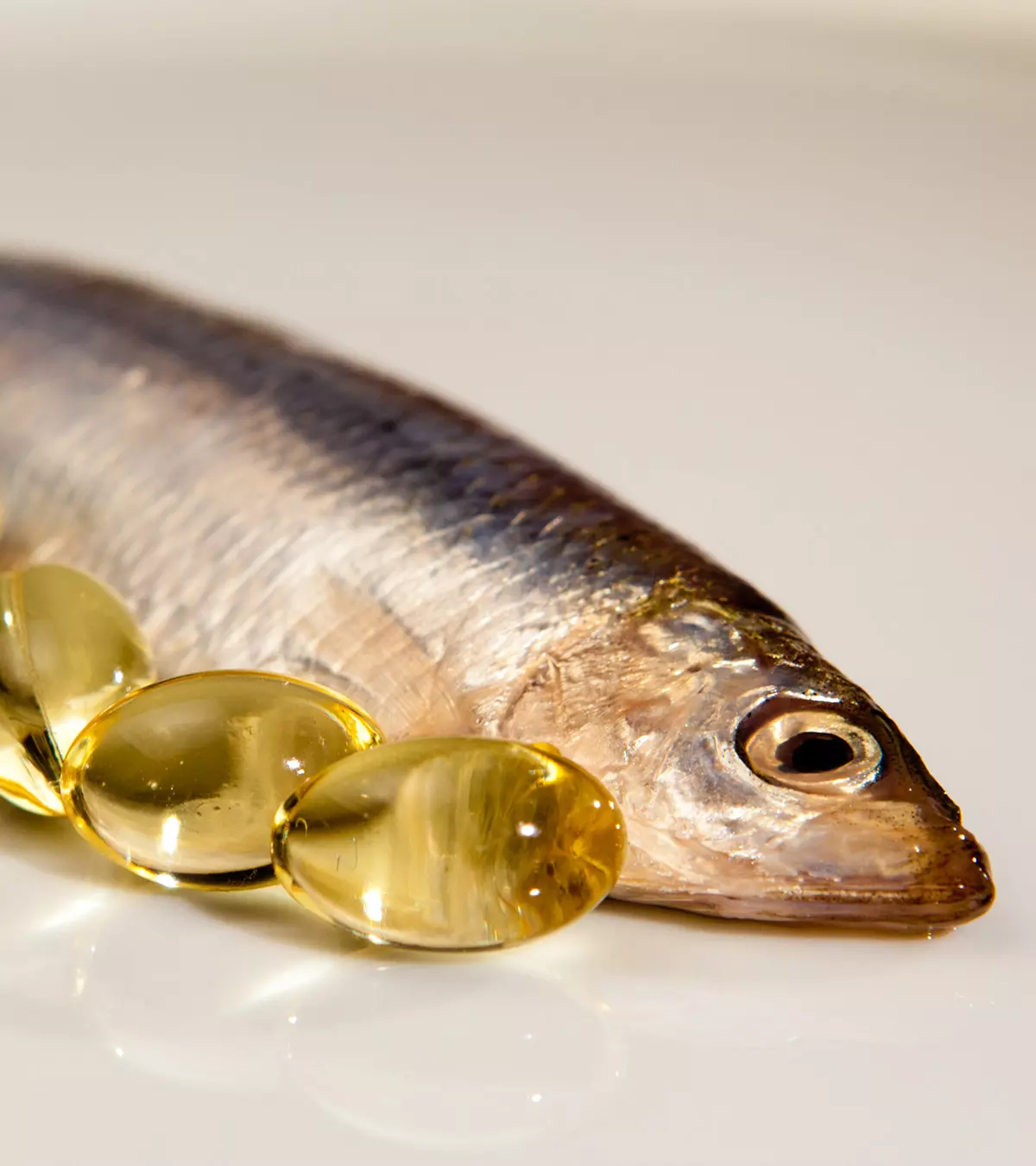
Image: Midjourney/ MomJunction Design Team
Babies eat whenever they feel hungry. Loss of appetite in babies is a common symptom associated with acute illness (1). But there could be times when the baby refuses to eat, despite feeling hungry for quite a while. However, there are several other reasons for a baby to lose appetite. For instance, babies may lose their appetite due to day-to-day changes or growth spurt. Alternatively, some babies may lose their appetite when they are teething. Whatever the case, appetite loss can be worrisome for parents, and they would want to know more about it in detail. So, here we bring you the signs that indicate your baby has lost its appetite, the possible causes, and more.

Key Pointers
- Symptoms such as vomiting, coughing, drooling, and refusal to eat favorite foods may indicate loss of appetite in babies.
- Loss of appetite in babies can be a normal part of some developmental stages and could be due to growth, teething, a sore throat, or overheating.
- Temporary loss of appetite in teething babies usually resolves in two weeks.
- Consult a pediatrician if the loss of appetite is persistent or accompanied by a fever and swollen glands.
- Incorporate zinc-rich and appetite-boosting foods and monitor meal intervals to improve your baby’s appetite.
Spotting Loss Of Appetite In Babies
Loss of appetite in babies can be a cause for concern, particularly if it leads to poor feeding and inadequate caloric intake, which can result in malnutrition and nutrient deficiency.
Infographic: Causes For Your Baby’s Loss Of Appetite
Some thing wrong with infographic shortcode. please verify shortcode syntaxAppetite loss could be due to any reason. If it is due to illness, behavior change is the first sign (2). Babies suffering from a loss of appetite could exhibit the following signs (3):
- Irritation
- Frequent vomiting or oral aversion
- Cough
- Abdominal pain
- DroolingiExcessive saliva flowing out of the mouth
- Refrains from eating favorite foods
- Lack of interest in food
- Bottle refusal
Loss of appetite can be a concern if you are not aware of its causes. Therefore, it is very important to know why your little one is experiencing a loss of appetite.
What Are The Causes For Your Baby’s Loss Of Appetite?
A temporary loss of appetite in an otherwise healthy, happy, and constantly growing baby is considered normal (4). In general, loss of appetite in babies could be caused during some developmental processes such as developmental delays, and not necessarily due to an underlying health issue or mere mood change.
Hannah Whittaker, an expert pediatric and pregnancy dietician from Liverpool, England, says, “A baby’s appetite can frequently fluctuate due to developmental stages and illness, whether it is a tummy bug or teething. I would advise mums to ensure that their baby continues to take formula or breastfeeds during this time. Babies’ appetites will likely pick up when they feel better.”
A few developmental changes that could cause appetite slump include:
1. Growth:
Your baby’s growth rate will be high until six months, slows down from six to 12 months, and comes down further between 12 and 18 months. So, it is natural for your baby of 16 months to eat less than what they used to eat at 12 months. This drop in the food intake could be due to a simple reason that the baby may not require so many calories (4).
2. Teething:
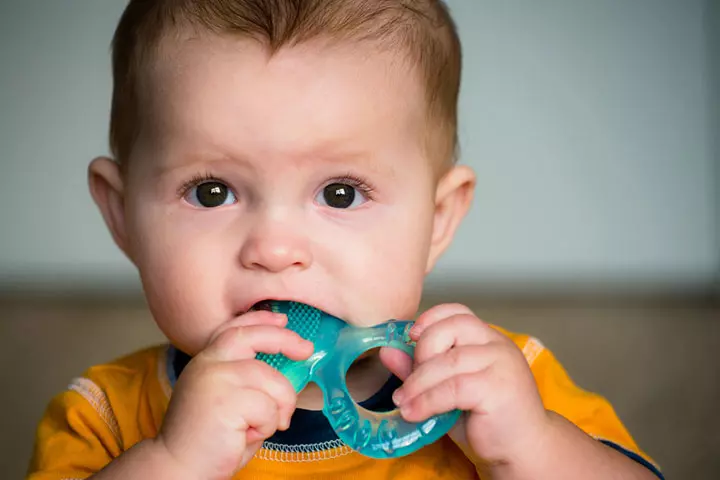
Temporary loss of appetite is common in teething babies, and usually gets resolved in two weeks. You might find that your baby refuses to eat or may eat less due to the pain caused by the teeth tearing through the gums. The discomfort increases when they eat food or feed from a bottle (5).
Teething even causes inflamed gums, leading to ultra-sensitive teeth. Even the slightest touch can cause pain. If the baby refuses to eat because of the pain, it may affect their health. Make sure that they drink lots of fluids and try tempting them with some treats.
A few pieces of chilled fruits and ice lollies may be helpful while teething (6). If your baby is old enough for solid foods, you can feed them yogurt and applesauce as they are easier to eat. If the baby does not gain a normal appetite after two weeks, then you should consult a doctor.
If these developmental reasons are not causing the change in appetite, you may have to look for signs of medical issues.
3. Sore throat:
A sore throatiPain or irritation in the throat which makes swallowing difficult caused by a strep throat or a viral infection can also be one of the reasons for loss of appetite in your baby (7). A sore throat can cause difficulty while swallowing. If it is accompanied by fever and swollen glands, you should immediately seek a healthcare provider’s help to get rid of the infection and bring back your baby’s appetite.
4. Overheating:
Overheating can cause sweat and crankiness, which can make it difficult for babies to eat and affect their appetite. Loss of appetite can be considered a symptom of heat exhaustion in children (8). Though it is a common issue in hot weather, you can take the following measures to combat the problem:
Cooling down:
Your baby may not feel like eating when it is too hot and uncomfortable. So, you may take these steps to cool them down:
- Dress your baby in light cotton clothing and a cloth nappy that will not stick to their body.
- Keep them in a breezy, shady, and cool area.
- Give them a bath with lukewarm water.
- Cool your baby instantly using a tidy wet cloth.
- Offer a children’s electrolyte solution to keep them hydrated (8).
Changing menu:
- Your baby may find regular meals heavy and uncomfortable because of the heat. Offer wholesome foods that may be lighter on the tummy.
- During the hot weather, your baby will not use energy to maintain their body temperature (unlike in winter, your baby’s body may burn calories to stay warm in the cold) and may not eat as much as before to replenish their body. Keep them active by allowing them to play indoor games and activities. It may work on the appetite.
Make sure you keep them hydrated and cool always. If these symptoms do not seem to improve, consult a pediatrician immediately.
5. Type of food:
Some foods take a longer time to digest, and therefore your baby’s tummy may be full, making them refuse food even after a significant gap. Whole grains, which are rich in fiber, are among the foods that make your baby’s tummy full soon (9). They could cause a momentary loss of appetite in babies.
 Quick tip
Quick tip6. Introducing solid foods:

As per research, many parents notice that their baby becomes fussy, moody, and unpredictable with eating habits when switching from breast milk to solid foods (10). Until six months, your baby is only on milk. When you introduce solid foods, their body will take time to adjust. The process of digestion would take a longer time, and they may eat less.
To avoid that, you may introduce new foods in small quantities so that their appetite is not disturbed much.
7. Worm infestation:
Another common cause of low appetite is worm infestationiPresence of worms in the intestine . Babies and toddlers may be at greater risk of intestinal parasites and worms. Worm infestation can cause symptoms such as appetite loss, weight loss, and restlessness in infants (11). The condition is common across various countries. The World Health Organization states, “Soil-transmitted helminth (STH) infections are among the most common infections worldwide with an estimated 1.5 billion infected people or 24% of the world’s population (12).” It is vital to seek immediate medical help if your child is affected by worms.
8. Poor health:
If your baby is unwell, they may refuse to eat (13). If they have a fever or febrile illness, cold, cough, or digestive problems such as a stomach upset and gastrointestinal distress, they lose appetite. They can gain that back after recovering from the illness.
Bacterial and viral infections can also make your baby reluctant to eat food. Conditions such as ear infections, bronchitisiA respiratory tract infection that irritates the larger airways within the lungs , and flu can cause rapid heartbeat and pain, making it difficult for your little one to eat (14). Seek immediate medical assistance in this case. Also, make sure that they are given preventive vaccinations against all the common infections.
9. Excess fluid intake:
Excess intake of fluids such as juices and water can be another reason for low appetite in babies (14). Once the tiny stomach is filled with formula or mother’s milk, they will not require any additional water. Giving excess water will also hinder them from absorbing nutrients in breast milk or formula milk. It makes them feel full and could lower their appetite.
10. Food intolerance:
Intolerance to some foods, such as eggs, milk, soy and peanuts, can cause symptoms like itching, bloating, diarrhea, and low appetite. You should identify your baby’s food allergies to avoid them (15).
11. Vaccination:

Some vaccinations would cause the temperature to shoot up in babies. Temperature, along with the pain of the prick, can make your baby less hungry (16). Additionally, if your baby is undergoing treatment for an underlying health condition, appetite loss may also be a medication side effect.
12. Constipation:
If your baby suffers from constipation, where bowel movements become difficult, they may not feel hungry (17). Giving them a diet rich in fiber can help ease their bowel movements.
13. Anemia:
If your baby has low iron content or is anemic, they may suffer from loss of appetite (18). Generally, babies with anemia tend to have weakness or lethargy and are exhausted most of the time. It is wise to take them to a pediatrician in such a case, as it can affect their development. Also offer foods that are rich in iron.
14. Too much strain:
It can also be one of the causes of appetite loss in babies who tend to play too much and become too tired to eat. Regulate your baby’s playtime to avoid that.
When To Call The Doctor?
Most of the causes for loss of appetite are harmless. However, there are some that warrant prompt medical intervention. Whittaker suggests, “I would advise parents to check that their baby has wet and dirty nappies frequently. If nappies become dry or the baby is constipated, they may be at risk of dehydration. Another sign of dehydration would be that your baby is lethargic. In the longer term, weight loss can also be seen in babies who reduce their food intake. So, if this is the case, speak with your doctor and dietitian for support.”
It’s important for parents to be aware of the signs of pediatric anorexia and poor feeding to seek medical attention if they are concerned about their baby’s nutritional status and growth. Below is a list of such instances(13) (19):
- No improvement in the appetite of your baby.
- Examine the food habits of your baby carefully for a few days. Do not be worried if they do not eat for two days. But if it continues for one week or more, then take them to a doctor.
- Loss of appetite accompanied by a rash, fever, or change in stool color should be checked by a physician soon.
- Constant loss of weight.
- The baby is excessively irritable or inconsolable.
- The baby has not gained weight in six months.
- The baby is gagging on or vomiting some foods.
 Be watchful
Be watchfulWhat Can You Do To Treat Poor Appetite In Babies?
When your child is consuming less than usual, notice their habits carefully. Often, babies tend to get their appetite back naturally and get back to eating as they did before. Aderet Dana Hoch, a New York-based registered dietician and nutritionist, says, “If an infant or toddler is experiencing decreased appetite with no medical issue, then parents may help by starting conversations about hunger and fullness cues with their child from a very young age, making mealtimes simple with little distractions, and seeking professional help during the transitional phases.”
Here is what you can do to aid that.
- Offer age-appropriate foods to your baby.
- Give them a healthy diet and maintain a proper gap as it helps in keeping their appetite in check.
How Can You Increase Your Baby’s Appetite?
Encouraging your baby to eat and maintain a healthy appetite can be challenging, but several strategies can help. Here are some ways you can encourage your baby to eat and maintain a healthy appetite:
1. Increase zinc levels
Zinc helps to produce hydrochloric acid, which aids proper digestion. Low amounts of zinc in your baby’s body could cause a low appetite (20). You can increase zinc content by giving chicken, pumpkin seeds, and cashew nuts to your little one. However, consult your doctor before giving any artificial sources or supplements. According to the American Academy of Pediatrics, “Vitamins, iron, and other specific nutrients act as appetite stimulants only in the presence of deficiency of the particular nutrient (21).”
2. Adequate gaps between meals
Stick to a set schedule for meals and snacks to create a routine (13). Babies can take three to four hours to digest their meals. If you do not maintain the gap and give them food in quick succession, they may not eat properly.
3. Creating a positive eating environment
Creating a calm and welcoming mealtime atmosphere can greatly improve your baby’s willingness to eat. Minimize distractions by turning off screens and interacting with your baby during meals. Encourage family meals to help your baby feel secure and comfortable with food (13).
4. Foods that increase appetite in babies
Foods that can possibly improve your baby’s appetite are as follows. It is advisable that you consult a pediatrician before you offer any of these:
Ajwain:
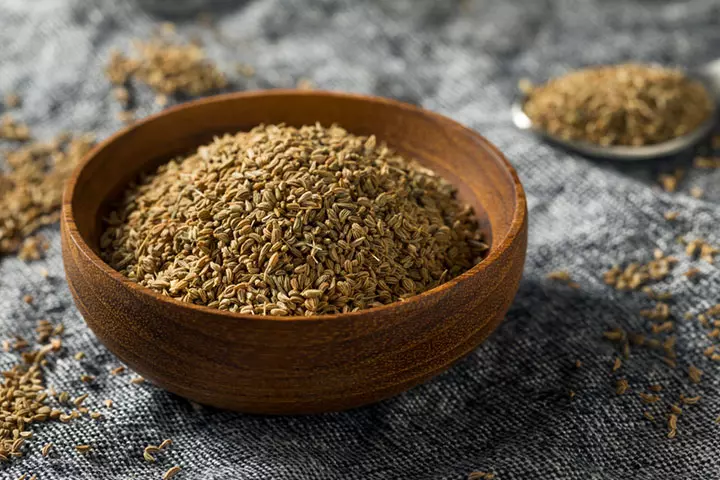
In Ayurveda, the use of ajwain to increase appetite has been present for a very long time now (22). Ajwain water can be given to babies aged six to eight months. Soak a few carom seeds in water and leave for a few hours. If your baby is on solids, you can mix ajwain seeds in the food.
Asafoetida:
In Ayurveda and folk medicine, asafoetida is believed to increase appetite. Also known as hing, it is a digestive stimulant that increases appetite. It also works as an anti-flatulent and helps release intestinal gas. Add a pinch of this to your baby’s food or buttermilk, or any vegetable curry. It might help to improve your baby’s appetite.
Basil:
Same as asafoetida, the use of basil to treat appetite-related issues dates to ancient times. You can start giving basil to your baby when they are eight months old. It increases digestion ability and improves appetite.
Cinnamon:
It contains hydroxy chalcone, which is considered to boost appetite. The German Commission E recognizes the use of two varieties of cinnamon in treating loss of appetite (23). However, the safety and efficacy of its use in babies are still being studied. You can give this to your baby when they are around seven to eight months old but consult the pediatrician before. You can add cinnamon powder to any mash, porridge or smoothie, dessert, bread, and cakes.
Ginger:
A research study suggests that ginger may act as an appetite stimulant (24). There are many other studies that point at ginger’s potential as an appetite booster. It is due to this property of ginger that it has been used in ancient medicinal practices like Ayurveda for centuries. Crush some ginger and add the juice with some salt and pepper to buttermilk and give it to your baby.
Mint:
Mint not only gives a refreshing flavor to the food but is also believed to help regulate appetite. Mint initially suppresses appetite but, after some time, causes severe hunger. You can add a little of it to your baby’s meal.
Peanuts:
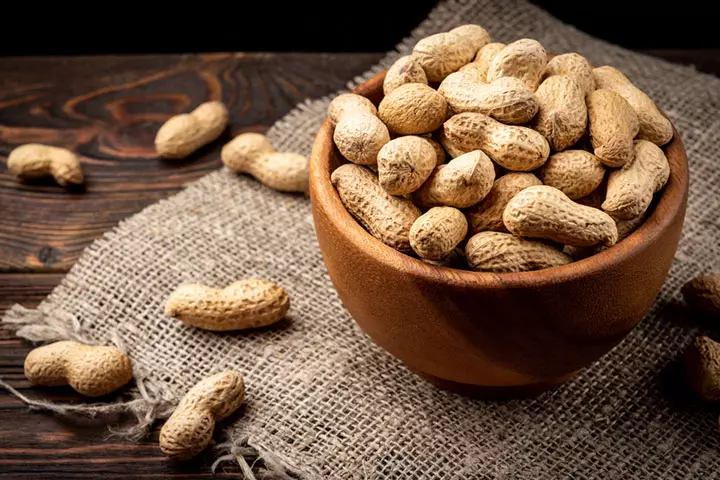
Peanuts contain high amounts of zinc, and hence are believed to aid in proper digestion and improved appetite. However, clinical studies to prove this relation are sparse. Moreover, some babies can be allergic to peanuts. So, use them cautiously. You can give a few roasted peanuts, apply peanut butter spread on bread, or add to milkshakes.
If you notice that your baby’s lack of appetite is leading to weight loss, it’s important to seek medical help. Timely intervention can prevent further complications and support healthy growth.
A mother shares her experience of seeking medical advice when her one-year-old daughter, Ayla, struggled with a poor appetite. She says, “We also met with an Integrated Medicine doctor who’s prescribed a number of supplements to increase Ayla’s appetite, encourage better bowel function, and replace essential microflora that’s missing from her gut. This activity will accompany the already prescribed baby biotics, bile salts, and enzyme replacements by our dietician, and we’ll be able to get started on them almost straight away (i).”
Frequently Asked Questions
1. What can I feed my baby with no appetite?
It is usual for babies to lose appetite when sick. If a baby isn’t feeling hungry, don’t force-feed them. Instead, be patient and encourage them to drink healthy fluids, such as coconut water, to stay nourished and hydrated. Additionally, serve them their favorite food and make the food appealing. Unless advised, you don’t need to serve bland, fluid, or semi-fluid food to your baby.
2. Why is my baby sleeping more and eating less?
There could be several reasons for a baby sleeping more and eating less. For instance, babies usually sleep more during a growth spurtiA short duration during which a child grows rapidly . Their appetite also changes during this phase, and they may eat more or less than their usual intake. Teething and ill health are other reasons a baby may sleep more and eat less. Generally, the cause of a baby’s eating and sleeping pattern change are benign. Yet, if you have any doubts, seeking medical guidance can help.
3. Does multivitamin increase appetite in babies?
“There is no strong evidence to support this, but if a dietitian or doctor recommends supplementation, it can be tried as a method to help fill gaps while the child may not be getting enough from food intake. This may also help end the cycle of poor appetite. Be sure to follow the guidelines of a healthcare professional,” Dana Hoch opines.
Loss of appetite in babies is considered normal if they grow well and are happy and active. However, it is essential to understand the reason behind the loss of appetite to address it on time. Babies may lose their appetite due to developmental changes such as teething, sore throat, or worm infestation. Managing these factors may bring back the appetite. You may offer age-appropriate foods and increase zinc levels to encourage children to eat. However, if your babies show no improvement in appetite or are constantly losing weight, consult a doctor promptly to diagnose the underlying condition behind their appetite loss.
Discover natural ways to increase your baby’s appetite and promote their health. Explore helpful tips and tricks to encourage your newborn, baby, or toddler to eat more in this video.
Illustration: Baby Loss Of Appetite: Symptoms Causes And Tips To Improve
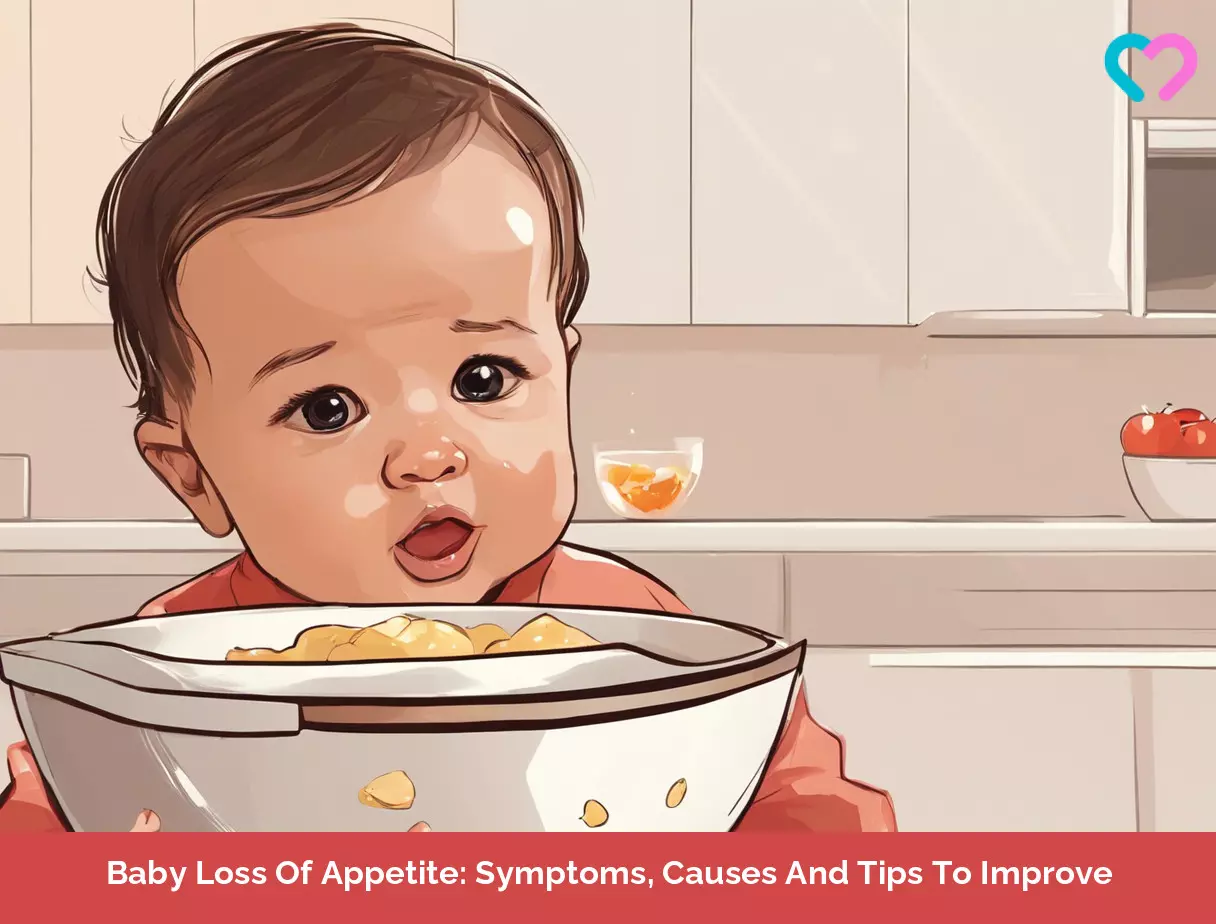
Image: Stable Diffusion/MomJunction Design Team
Personal Experience: Source
MomJunction articles include first-hand experiences to provide you with better insights through real-life narratives. Here are the sources of personal accounts referenced in this article.
i. Getting there.
https://an-ayla-a-day.com/2014/09/02/getting-there/
References
- Loss of Appetite.
https://publications.aap.org/pediatriccare/article-abstract/doi/10.1542/aap.ppcqr.396092/1573/Loss-of-Appetite?searchresult=1?autologincheck=redirected - Behavior Changes.
https://www.stanfordchildrens.org/en/topic/default?id=behavior-changes-90-P02663 - Poor Appetite in Children – Causes and Tips to Improve.
https://www.narayanahealth.org/blog/poor-appetite-in-children-causes-and-tips-to-improve - Why Is My Child Suddenly Not Eating?
https://healthcare.utah.edu/the-scope/kids-zone/all/2025/11/why-my-child-suddenly-not-eating - Teething in babies and young children.
https://www.nct.org.uk/information/baby-toddler/caring-for-your-baby-or-toddler/teething-babies-and-young-children - Your Infant is Teething: Know the Signs and Symptoms.
https://www.chla.org/blog/advice-experts/your-infant-teething-know-signs-and-symptoms - Pharyngitis and Tonsillitis.
https://www.hopkinsmedicine.org/health/conditions-and-diseases/pharyngitis-and-tonsillitis - Heat-related Illness in Children.
https://www.texaschildrens.org/content/conditions/heat-related-illness-children - Dietary Fiber.
https://www.eatright.org/health/essential-nutrients/carbohydrates/fiber - Annelise Norlyk et.al; (2019); Infants’ transition from milk to solid foods – the lived experiences of first-time parents.
https://pmc.ncbi.nlm.nih.gov/articles/PMC6882487/ - Kishour Kumar Digra et.al; (2017); Neonatal Worm Infestation: A Rare Entity.
https://medcraveonline.com/JPNC/neonatal-worm-infestation-a-rare-entity.html - Soil-transmitted helminth infections.
https://www.who.int/news-room/fact-sheets/detail/soil-transmitted-helminth-infections - Your Child’s Appetite Has Changed: When to Worry.
https://www.rileychildrens.org/connections/your-childs-appetite-has-changed-when-to-worry - Appetite slump in toddlers.
https://www.aboutkidshealth.ca/appetite-slump-in-toddlers - Allergies & Food Intolerances.
https://laleche.org.uk/allergies/ - Vaccines Your Child Needs by Age 6.
https://www.healthychildren.org/English/safety-prevention/immunizations/Pages/Your-Babys-First-Vaccines.aspx - Wendy S. Biggs And William H. Dery; (2006); Evaluation and Treatment of Constipation in Infants and Children.
https://www.aafp.org/pubs/afp/issues/2006/0201/p469.html - 13 Symptoms of Low Iron in Kids.
https://health.clevelandclinic.org/what-causes-iron-deficiency-in-your-child-and-how-to-spot-it - Failure to Thrive In Infants.
https://www.nationwidechildrens.org/conditions/failure-to-thrive-in-infants - Majid Khademian et.al; (2014); Effects of zinc supplementation on subscales of anorexia in children: A randomized controlled trial.
https://pmc.ncbi.nlm.nih.gov/articles/PMC4320702/ - FACTORS AFFECTING FOOD INTAKE : COMMITTEE ON NUTRITION.
https://publications.aap.org/pediatrics/article-abstract/33/1/135/41776/FACTORS-AFFECTING-FOOD-INTAKE-COMMITTEE-ON?redirectedFrom=fulltext - Eetela Sathyanarayana et.al; (2019); Effect of nutrient levels on nutrient uptake by seeds of ajwain (Trachyspermum ammi L. Sprague).
https://www.researchgate.net/publication/333422151_Effect_of_nutrient_levels_on_nutrient_uptake_by_seeds_of_ajwain_Trachyspermum_ammi_L_Sprague - Rebecca B Costello et.al; (2017); Do Cinnamon Supplements Have a Role in Glycemic Control in Type 2 Diabetes – A Narrative Review?
https://pmc.ncbi.nlm.nih.gov/articles/PMC5085873/ - D D Wadikar et.al; (2010); Development of ginger based ready-to-eat appetizers by response surface methodology.
https://pubmed.ncbi.nlm.nih.gov/20417239/
Community Experiences
Join the conversation and become a part of our nurturing community! Share your stories, experiences, and insights to connect with fellow parents.
Read full bio of Huda Shaikh
- "Aderet Dana Hoch is a dietician and founder of Dining with Nature, a virtual private practice. She did her BS in Nutrition & Dietetics from New York University and MS in Nutrition Education from Teachers College Columbia University. Before starting her private practice, Aderet worked in the food industry, gaining experience in the Community and Food Service Management areas of the nutrition field. "
 "Aderet Dana Hoch is a dietician and founder of Dining with Nature, a virtual private practice. She did her BS in Nutrition & Dietetics from New York University and MS in Nutrition Education from Teachers College Columbia University. Before starting her private practice, Aderet worked in the food industry, gaining experience in the Community and Food Service Management areas of the nutrition field. "
"Aderet Dana Hoch is a dietician and founder of Dining with Nature, a virtual private practice. She did her BS in Nutrition & Dietetics from New York University and MS in Nutrition Education from Teachers College Columbia University. Before starting her private practice, Aderet worked in the food industry, gaining experience in the Community and Food Service Management areas of the nutrition field. "
Read full bio of Swati Patwal
Read full bio of Rohit Garoo
Read full bio of Ghazia Shah












